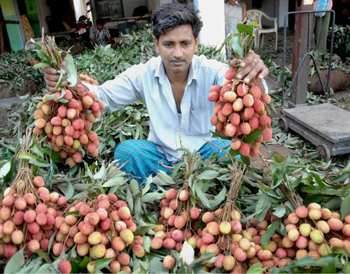New Delhi, Feb 2: Since 1995, every year a mysterious disease has been haunting Muzaffarpur in Bihar, in which large numbers of children would get feverish, then proceed to having seizures and convulsions and finally slipping in and out of consciousness. Scores of researchers and experts have launched exhaustive searches to find the root cause of this deadly disease, but to no avail. Until now.
 In 2014, hundreds of children were admitted to hospital with symptoms of this illness, locally called as “chamki ki bimari,” or “tinsel disease.” Of 390 admitted for treatment, 122 died, reports CNN.
In 2014, hundreds of children were admitted to hospital with symptoms of this illness, locally called as “chamki ki bimari,” or “tinsel disease.” Of 390 admitted for treatment, 122 died, reports CNN.
A new report published in The Lancet Global Health medical journal, claims to have discovered the source of the disease, which is the litchi fruit.
The illness, whose symptoms are said to resemble encephalitis, have several factors contributing to it including, heat, humidity, malnourishment and pesticides.
Researchers from the US Center for Disease Control and Prevention and India’s National Centre for Disease Control compared test results of children who had developed the mysterious illness, and children who had not.
According to the study, most the sick children had consumed the fruit recently and were also six times more likely to have visited a fruit orchard in the last 24 hours.
Muzaffarpur, is the largest litchi farming region in India.
The results said that children who fell ill were twice as likely to have skipped dinner, which, according to the researchers probably resulted in “night-time hypoglycaemia.”
However, urine samples showed that two-thirds of the ill children showed evidence of exposure to toxins found in lychee seeds -- found in higher levels in unripe fruits.
In the presence of these toxins “glucose synthesis is severely impaired,” the study said, leading to dangerously low blood sugar and brain inflammation in the children.
Following the developments, the Centre had issued a statement advising children to henceforth “minimise litchi fruit consumption” in affected areas, and eat an evening meal during the “outbreak period.”





Comments
Add new comment